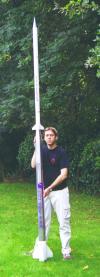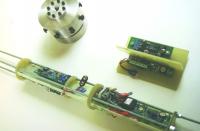Phobos EAV Altitude Attempt
 Early on September 26th, the MARS flight crew packed their newest
vehicle into the belly of a 767 to take it to the launch site in Blackrock,
Nevada. Phobos EAV (PEAV) pictured to the right being supported by Ben
Jarvis, is the latest in a line of experimental vehicles, expanding on
existing technologies and establishing new ones.
Early on September 26th, the MARS flight crew packed their newest
vehicle into the belly of a 767 to take it to the launch site in Blackrock,
Nevada. Phobos EAV (PEAV) pictured to the right being supported by Ben
Jarvis, is the latest in a line of experimental vehicles, expanding on
existing technologies and establishing new ones.
The current MARS altitude record of 14,006ft was claimed in August 1998 with Transient Glory and this flight held the altitude record for amateur rockets built in the UK. until March 2000, when it was beaten by less than 400ft.
Being MARS, it was decided that the record should not only be reclaimed, but taken back in such a way as to raise the bar well out of the reach of potential challengers. Conservative estimates predict PEAV will top 50,000ft. The possibility for such a high altitude that is offered at the annual Tripoli BALLS event, and the chance to regain a title that had previously always been held by MARS prompted the team to turn the idea into a reality in less than a month, though it did include a number of rather late nights and juggling of day jobs.
The first stage is powered by an O class motor, which will take the vehicle supersonic before it reaches 1000ft. On burnout, this stage falls to earth, deploying its own recovery system, while the dart which sits on top coasts to a much higher altitude, using the momentum gained from the booster.
 The rockets payload consists of multiple data recording modules
and redundant recovery systems, designed to ensure that the acheived
altitude is verifiable by independant adjudicators following launch.
The rockets payload consists of multiple data recording modules
and redundant recovery systems, designed to ensure that the acheived
altitude is verifiable by independant adjudicators following launch.
Hopes of taking photograph the Earths curvature were dashed as looming deadlines prevented the camera payload being completed in time to test. Also, the onboard GPS system will allow the flight path followed to be rendered and viewed in 3D, giving a better understanding of the flights dynamics.
The launch is scheduled for September 30th, however if conditions are favourable on the 29th, it may be launched a day early.
 PEAV was partially funded by www.m85.com
so if you're looking for a networking solution, talk to them, and tell them
MARS sent you, and help fund our research.
PEAV was partially funded by www.m85.com
so if you're looking for a networking solution, talk to them, and tell them
MARS sent you, and help fund our research.










